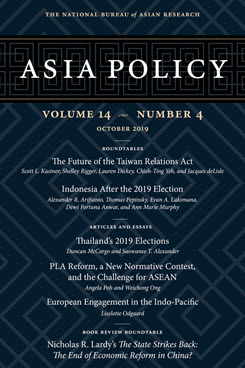Indonesia After the 2019 Election
In the roughly twenty years since the fall of Suharto’s authoritarian New Order regime in 1998, Indonesia has made considerable progress toward becoming a fully functional democracy. This Asia Policy roundtable examines the outcomes and implications of the 2019 Indonesian presidential election. It also addresses Indonesia’s regional leadership role in Southeast Asia and what Jokowi’s foreign policy toward Asia and the United States might look like during his second term.
Introduction
What the 2019 Election Says about Indonesian Democracy
Alexander R. Arifianto
Islam and Indonesia’s 2019 Presidential Election
Thomas Pepinsky
Civil-Military Relations under Jokowi: Between Military Corporate Interests and Presidential Handholding
Evan A. Laksmana
Indonesia’s Regional Foreign Policy after the 2019 Election
Dewi Fortuna Anwar
Prospects for U.S.-Indonesian Relations in Jokowi’s Second Term
Ann Marie Murphy
Introduction
Indonesia’s 2019 general election and the inauguration of Joko Widodo (Jokowi) for a second term as president took place concurrent with the United States and Indonesia celebrating 70 years of diplomatic relations, making this an opportune time to assess the state of democracy in Indonesia and the role the country plays in the Indo-Pacific region. This Asia Policy roundtable examines the outcomes and implications of the 2019 Indonesian presidential election. It also addresses Indonesia’s regional leadership role in Southeast Asia and what Jokowi’s foreign policy toward Asia and the United States might look like during his second term.
In the roughly twenty years since the fall of Suharto’s authoritarian New Order regime in 1998, Indonesia has made considerable progress toward becoming a fully functional democracy—no small feat in a highly heterogeneous country of over 260 million people dispersed across more than seventeen thousand islands. In April, incumbent Jokowi defeated former three-star general and member of Suharto’s inner circle Prabowo Subianto in Indonesia’s fourth national presidential election. The election campaigns, as well as the election’s aftermath, were highly divisive due to the prevalence of religious-based identity politics and the political polarization of the candidates’ supporters. Prabowo ran an ultranationalist hard-line campaign and allied with conservative Islamist groups that are seeking to expand Islam’s role in public life. Jokowi campaigned on his first-term record of improving social programs and economic conditions, while also selecting the Islamic cleric Ma’ruf Amin as his running mate to boost his credentials among those who prioritize religion in their vote. Although Jokowi won with a record turnout, the election campaign period demonstrated a conservative turn in politics. As Alexander Arifianto points out, “Jokowi now faces the most serious challenges to his presidency.”
Arifianto opens the roundtable with an essay recapping the election and reviewing the factors that contributed to its political division and polarization. He concludes that Jokowi now faces major challenges from two distinct groups—the Jakarta elite and conservative Islamists—and that “both groups are threatening the future of Indonesia’s democracy…. How Jokowi deals with these challenges likely will define his legacy as Indonesia’s seventh president.”
The first of these challenges—the widening electoral divide based on religious identity—is addressed by Thomas Pepinsky. His essay presents electoral and demographic data to outline this emerging religious cleavage and provides clues about its implications going forward. Evan Laksmana examines an important aspect of the second challenge—the disposition of civil-military relations. He points out that “the 2019 elections did not change the fact that Jokowi is a president without his own political party and that he needs the support of the broader security establishment…to execute his agenda.” Laksmana argues that in his second term, Jokowi will likely remain largely hands-off toward the military, while the military will continue to advance its organizational autonomy and political role. If not carefully handled, both challenges could have detrimental effects on the structure of Indonesia’s democracy.
Dewi Fortuna Anwar’s essay looks at Indonesias regional foreign policy and economic relations, with an eye on how these might play out in Jokowi’s second term. According to Anwar, Jokowi’s two key foreign policy objectives are “economic development and ensuring a peaceful, autonomous regional order.” Relations with the Association of Southeast Asian Nations (ASEAN) and other Asian countries thus dominate Indonesia’s foreign policy and will likely continue to do so, particularly for economic reasons. Turning to U.S.-Indonesian relations, Ann Marie Murphy’s essay addresses a critical implication of the Indonesian election for the United States—the election’s outcome—as well as near-term prospects for bilateral relations in the economic, security, and political arenas. While opportunities exist to enhance the bilateral relationship, she argues that significant obstacles are also present. If these are well-managed, there is room to grow bilateral relations.
Indonesia is often considered a beacon of democracy and pluralism in Southeast Asia, and it has assumed a leadership role in ASEAN as well as developed a stable partnership with the United States. The essays presented in this roundtable offer a clear picture of cleavages and issues that must be dealt with in Indonesian politics in the years ahead for the country’s democracy to remain viable and strong.
About Asia Policy
Asia Policy is a peer-reviewed scholarly journal presenting policy-relevant academic research on the Asia-Pacific that draws clear and concise conclusions useful to today’s policymakers. Asia Policy is published quarterly in January, April, July, and October and accepts submissions on a rolling basis. Learn more


